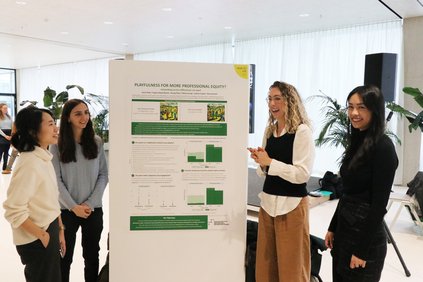Background - 06.05.2022 - 00:00
Sustainability in retail is a monumental task
Raoul Rossmann, CEO of the German drugstore chain Dirk Rossmann GmbH, discussed sustainability in retail with guests of the St.Gallen Symposium, HSG marketing expert Prof. Dr. Johanna Gollnhofer and business journalist Martina Fuchs. A relevant topic particularly to Millenials.

6 May 2022. The retail trade is considered the link between producers and consumers. Sustainable products must be produced in an environmentally friendly manner and in accordance with labour law at all levels of the supply chain. What is perceived as sustainable depends on various motives, the panel said. Animal welfare, environmental protection, human rights and the global climate are all equally important. The question of which product packaging is the most sustainable from the customer's point of view is also complex. For certain products, such as cucumbers, plastic packaging can ensure a longer shelf life, but it is not environmentally friendly.
Changing purchasing behaviour
After almost 50 years of company history, Dirk Rossmann GmbH looks at change in the wake of trends. During the discussion, Rossmann recalled a time when the issue of microplastics came strongly into focus. In such cases, communicating solutions quickly and effectively could make sense from the customer's point of view. But marketing can also be critical: The media presence of "organic labels", for example, has made many customers rather skeptical, as studies with the analysis tool Google Trends also show. In order to change buying behaviour in the long term, there always needs to be a certain "background noise" in the online world, said Rossmann.
Sustainability must not be too expensive
In the marketing of sustainable products, more focus should be placed on self-realisation and freedom in future, instead of obligation, surmised Johanna Gollnhofer. For her, the fun factor was missing in the promotion of sustainable products. During the pandemic, people were virtually forced into sustainability - fewer journeys and flights, the reduction of which is considered an essential sustainability driver. In terms of purchasing behaviour and lifestyle, however, those with lower incomes in particular do not have the financial resources to always pay attention to sustainability.
And what about the Millenials? Gollnhofer answered moderator Martina Fuchs' question whether she thought that sustainability is in their DNA. The younger generation shares a different perspective on brands. They demand ethical and sustainable behaviour from companies and also choose their employers accordingly. According to consumer theory, personal purchasing behaviour expresses one's own convictions. The search for self-efficacy is also great among Millenials, added Rossmann. Younger people want to feel that they are effectively countering climate change instead of feeling powerless.
Positioning sustainable products credibly
Implementing sustainability well is a "monster task", said Rossmann. He sees a balanced energy mix, doing without gas and oil, as the only solution to real sustainability. The share of private labels in the drugstore chain is currently 25 per cent - responsibility must be borne from these. As a managing director with many years of experience in purchasing, it is important for him to sustainably align his expertise in logistics and building technology and to drive efficiency and profitability in line with sustainability goals.
"Thanks to machine learning and artificial intelligence, Dirk Rossmann GmbH is now able to efficiently predict product demand," Rossmann said. Controlling the large corporations such as Procter & Gamble or Beiersdorf with their product ranges in terms of greenwashing is almost impossible and not the task of the retailer, shared Rossmann. Thanks to selected project partners, however, credibility can be "taken over" - an example of a successful cooperation is Edeka with WWF. A label for sustainability alone is not enough. Rather, so-called consumer education must take place to eliminate customer confusion. In the end, it is the customer who decides.
More articles from the same category
This could also be of interest to you
Discover our special topics



![[Translate to English:] Choix Goncourt de la Suisse | unisg.ch](https://www.unisg.ch/fileadmin/_processed_/b/a/csm_Choix_Concourt_de_la_Suisse_HT-Stibi-069_2110740678.jpg)












